Category — Shul Talk
B’NAI BIG TENT
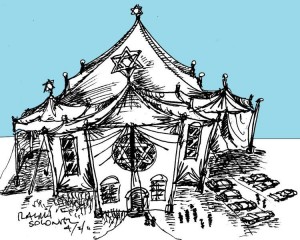
Yiddishe Cup does the occasional Torah march. We escort Torah scrolls and marchers in a parade from a “desanctified” synagogue to a newer synagogue.
We’re doing a Torah march Sunday, going from tiny Congregation Bethanyu in Pepper Pike, Ohio, to B’nai Jeshurun Congregation (BJ), a half mile away.
BJ is a shul-eater. It eats guppy shuls.
BJ is one of two “big tent” Conservative synagogues in Cleveland. The other is Park Synagogue. Park is bigger, but BJ is working on its mergers and acquisitions.
Two of BJ’s “guppy” meals were temples that had split off from BJ and — after decades of independence — re-docked with the mother ship (BJ).
Jewish unity: Jewnity. Jewnity means all Jews under one roof.
Rabbi Milton Rube, the emeritus rabbi at Bethanyu — the tiny shul that is closing — had been an assistant rabbi at BJ in the 1970s, when he and a group of young congregants split off. That’s how it goes; the young rabbi and young congregants think the stodgy old rich members are running the show too much.
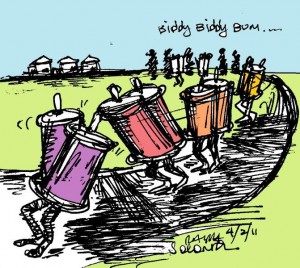
March of the Torahs, Pepper Pike
Last month, in the Cleveland Jewish News, Rabbi Rube said he personally won’t re-dock with BJ. He’s joining Park — the competition.
This is newsworthy, but not everybody thinks so. I tried to discuss Rabbi Rube at shabbes dinner (because temple gossip is a shabbes tradition at my house), but my friends at the shabbes table didn’t know what I was talking about. Did they even read the Cleveland Jewish News? No. Did they think the Jewish News was only for their parents? Yes. And their parents are mostly dead.
What if some day there is only one “big tent” Conservative shul left in Cleveland? Which will it be, Park or BJ? Who’s interested in that discussion?
If you are, please bring a challah (preferably from On the Rise bakery), a side dish and terrific chocolate dessert to my house this Friday night.
—-
THIS BLOG IS UPDATED every Wednesday morning. No more Friday morning updates. (Nobody was checking in then anyhow.)
Please stop by here every Wednesday morning for the latest. That’s probably what you’re already doing.
The Wednesday-morning tan email reminders will continue to go out, as usual.
April 6, 2011 11 Comments
YID LIDS
Maybe a collage artist can do something with my yarmulke collection, from 22 years’ worth of gigs. I know an artist — a bad one — who did something with old saxophone reeds.
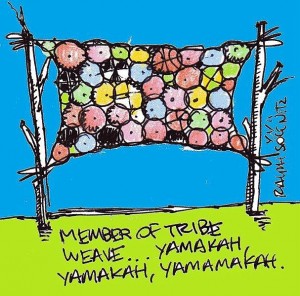 My Guatemalan yarmulkes, crocheted by Mayan Indians, are from neo-hippie weddings. There are no bouquet tosses, garter-belt strip routines, or formal introductions at these weddings. The Mayan kippot (yarmulkes) are particularly popular with female rabbi brides. That’s a niche — weddings of women rabbis — that Yiddishe Cup has cornered in the Midwest.
My Guatemalan yarmulkes, crocheted by Mayan Indians, are from neo-hippie weddings. There are no bouquet tosses, garter-belt strip routines, or formal introductions at these weddings. The Mayan kippot (yarmulkes) are particularly popular with female rabbi brides. That’s a niche — weddings of women rabbis — that Yiddishe Cup has cornered in the Midwest.
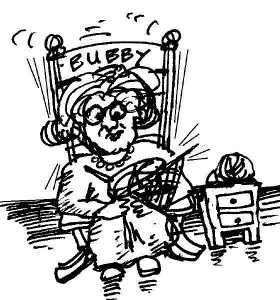 The most heymish lids are grandmas’ knitted yarmulkes.
The most heymish lids are grandmas’ knitted yarmulkes.
My blue suede yarmulkes are from A-1 Skull Caps. The lids don’t breathe. Skull cap. I like a yarmulke that breathes.
Camouflage kippahs exist, too. One Yiddishe Cup musician, a pacifist, declined to wear his camo lid at a Zahal-themed bar mitzvah. Zahal is the Israel Defense Forces (IDF). The bar mitzvah boy’s father wore combat boots and a full Israeli uniform. The band wore IDF T-shirts and camouflage yarmulkes. (Nobody noticed our musician in street clothes.)
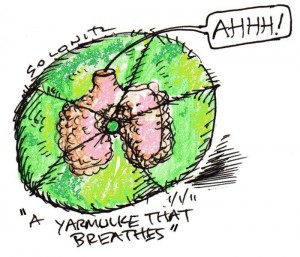 I have six purple kippot from a bar mitzvah. I thought the band might want to wear the lids again at another bar mitzvah. Go for the clean David Clark Five look. The guys declined.
I have six purple kippot from a bar mitzvah. I thought the band might want to wear the lids again at another bar mitzvah. Go for the clean David Clark Five look. The guys declined.
We wore sports yarmulkes — plus basketball jerseys — at a sports-themed bar mitzvah party. The party even had a cheerleading squad:
Mazel tov / Let’s shout hurray / It’s Jeremy and Sam’s bar mitzvah day!
I say oy / You say vey / Jeremy and Sam are men today!
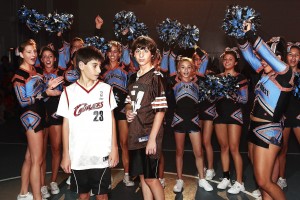
Yiddishe Cup’s keyboard player, Alan Douglass, frequently asks, “Is this a yarmulke gig?” He’s a goy and can’t figure out what’s up with the various Jewish denominations.
My Conservative rabbi wears a throwaway satin lid that funeral homes and synagogues give out. He apparently doesn’t want to look different from his congregants. I haven’t asked yet — after 20 years — why he wears the throwaway.
My white satin yarmulke from Dec. 9, 2007 has “Ananth Uggirala” — the groom’s name — in it. The groom’s parents were Anjaneyulu and Manorama Uggirala. I had to announce them. Tip, please.
You need good hair clips for a yarmulke. Bobby pins are the worst; they take your hair out with the yarmulke. Duck bill clips – also no good. The best clips are the surfboard barrettes. If you don’t have these clips, get some, particularly for outdoor gigs.
If you drop a yarmulke, you don’t have to kiss it before putting it back on. A lid is a lid. It’s not a holy object. Also, goys, wear the lid at the wedding ceremony; you’re not exempt.
At an American-Israeli wedding, one of the chuppah (bridal canopy) bearers smoked and balanced a drink. His yarmulke fell off. Secular Israelis, they’re funny that way.
It’s shocking when you see an Orthodox guy without a lid. For instance, an Orthodox man might go into a non-kosher restaurant on a road trip and take his yarmulke off. (Some Orthodox, when in the sticks, will go to a fast-food place for a salad.)
I wore a yarmulke for a week when I hitchhiked the coast of California in my twenties. I had seen a photo of Bob Dylan wearing a yarmulke at the Western Wall. Dylan did yahm-ops at The Wall every couple decades, it seemed.
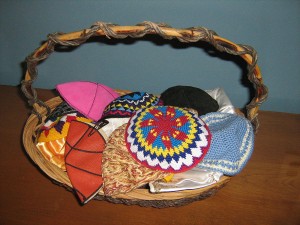
My Easter basket of yahms makes for a moderately interesting pop-psych experiment on shabbes: Who is going to take the pink, who is going to take the matzo-textured lid, and who is going to hide behind the black lid?
Have fun with lids. That’s in the Torah somewhere.
January 5, 2011 9 Comments
THE MIDWEST’S TOP 10 KLEZMER
. . . TOWNS
My nephew visits Big League baseball stadiums around the country as a hobby.
I visit Big League klezmer towns in the Midwest as a hobby. My remarks (below) are challah-to-challah comparisons. I’m not comparing Milwaukee to Paris.
The best Midwest klezmer towns:
1. Pittsburgh . . . Squirrel Hill, Shadyside. Everything you need. (Pittsburgh is not in the Midwest, but so what. It is west of the Alleghenies.)
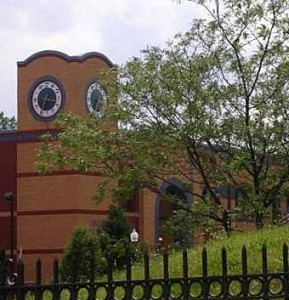
Hebrew clock. Pittsburgh JCC
2. Chicago. The Midwest klez capital. Maxwell Street Klezmer Band is the band in the Midwest. A Cleveland boy — a Northwestern student — worked in the Maxwell Street office; I had that kid wired. Yes, a klez band with office help. Chi is that big. Powerful klezmer forces prevail in Chi. Max Street does not allow Ohio bands within 80 miles of The Loop. Yiddishe Cup played Rockford, Ill., once.
3. Detroit. West Bloomfield, a Motown suburb, has Temple Israel, a very attractive modern temple. There is such a thing. At concerts, the Temple Israel ark is curtained off by a striking yarmulke mandala.
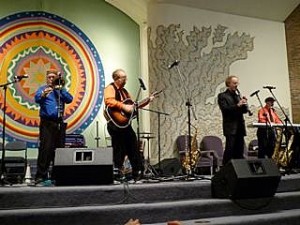
Yiddishe Cup at Temple Israel, 2010
4. Kansas City — as marvelously tough as Cleveland. KC’s Country Club Plaza is like Shaker Square but bigger and older.
5. St. Louis. Yiddishe Cup played there twice, then it all died out — the gigs. My Cleveland rabbi, who is from St. Louis, has a couple seats from the old Busch stadium. He should install the seats on our shul’s bima (altar) and invite Enos Slaughter to give the d’var torah (torah lesson/sermon). Good custard — Ted Drewes — in St. Louis. Similar to Cleveland’s East Coast Original Frozen Custard.
6. Milwaukee. Its claim to fame: songwriter Sigmund Snopek III, who wrote “Thank God This isn’t Cleveland.”
7. Minneapolis. There are a lot of klez bands up there: Prairie Heym Klezmorim, Klezmerica, etc. Too much klez in Minnie. Yiddishe Cup will never play there.
8. Cincinnati. The Plum Street Temple, where Stephen Wise officiated, is the most rakish and Moorish synagogue in the country. Check it out.
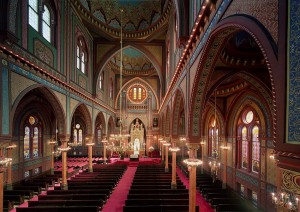
Plum Street Temple
9. Buffalo. Terrific art museum. Underrated.
10. Indianapolis. Overrated. A suburb of Atlanta.
Cleveland isn’t ranked. That wouldn’t be fair. But off the record, Cleveland is number one.
November 3, 2010 5 Comments
EXTREMELY EARLY HOLIDAYS
I sometimes celebrate the High Holidays a week or two before the real ones. I have the shul almost to myself. The upside: no annoying people.
However, this plan defeats one of the purposes of the High Holidays– hanging out with large numbers of Yidn. My rabbi says if you attend the real High Holidays– and shul in general– you’ll feel less lonely.
I sometimes get agitated on Rosh Hashanah morning because there is so much commotion and noise in the shul. Then the rabbi sermonizes about loneliness and community, saying, “Hell is other people according to Sartre, but what’s the alternative– sitting at home in your underwear watching reruns?” Point taken.
In the sanctuary, I see a doc who gave me a colonoscopy. I see, several rows over, a PhD scientist who is so anti-religious his seat needs an ejection button; his wife forced him to come. The guy next to me, a real estate broker, says, “How’s occupancies?”
“Commercial, bad. Residential, OK,” I say. I don’t mind some biz talk on yuntif. No big deal.
I see a weight-loss doc in the loges (the elevated seating around the perimeter of the sanctuary). Her picture is occasionally in the Cleveland Plain Dealer next to the word “obesity.” She’s in excellent shape.
A Jew visiting from New York gives me greetings from a New Rochelle cousin. Nice.
A couple people say hi to me because of the band. I don’t know their names.
After services, a worshipper asks if I remember him. Yes, I know him. A few years ago Yiddishe Cup played his son’s bar mitzvah. He is happy I remember him.
“You have to come over for shabbes,” he says. “And you won’t have to bring your clarinet.”
Sweet.
Happy New Year.
—-
1 of 2 posts for 9/8/10. Please see the post below too.
September 8, 2010 1 Comment
O.J. SIMCHA
Goys and many highly assimilated Jews think Yiddishe Cup plays primarily for Orthodox Jews. Not true. We play mostly for non-Orthodox Jews.
But we do play the occasional Orthodox Jewish gig.
Some of these gigs go NYC-style, fast-talking, cell-phones-beeping-everywhere frenetic. You’re in Israel but without the jet lag.
We play mostly OrthoRock tunes at Orthodox affairs. OrthoRock isn’t klezmer. It’s rock with liturgical lyrics. A classic OrthoRock tune is “Moshiach” (Messiah). Another is “Chazak” (Strength). These two tunes — plus a hundred others, some of which are popular only for a month or so– are the standard OJ (Orthodox Jewish) repertoire. Yiddishe Cup doesn’t learn the new tunes frequently enough. (We don’t get many OJ gigs either.)
The Orthodox families who hire Yiddishe Cup are typically left-wing Orthodox. Left-wing, here, means on the liberal end of ritual observance. The client might request, for instance, American rock and roll toward the end of the party.
Yiddishe Cup’s most right-wing gig was for the get (divorce decree) rabbi. We played a Purim tish (table gathering) at his house. All black hats and beards. The rabbi’s drosh (speech on a liturgical text) was in Yiddish.
My Conservative rabbi, when he heard about the get gig, couldn’t believe I’d been in the get rabbi’s house. He had never been in there.
Yiddishe Cup knows the rabbis the rabbis don’t.
Cleveland is large enough that Jewish denominations typically don’t party and pray together. If you want a mishmash of Jews in the same room, go to a smaller town, like Akron, Ohio. In Akron, the Orthodox and non-Orthodox will mix it up. It’s a matter of survival. Small numbers. You’ll see every kind of Jew but Jews for Jesus at an Akron Jewish gathering.
Musicians, take note: Don’t play “Hava Nagila” at an Orthodox simcha (celebration). Too goyish. Nevertheless, at one Orthodox wedding, the mom’s sister repeatedly requested “Hava Nagila.” I said no. Then some yeshiva buchers (students) from New York asked me for the song. I said, “Are you trying to embarrass the band?”
“No, we heard you’re a klezmer band and we’d like to hear it.”
The mom didn’t want it. Again, the mom’s sister said play it. Again, the buchers said play it. The mom finally relented. We played it.
The buchers danced with ruach (spirit) to the tune. “Hava Nagila” is originally a Hasidic nign (wordless melody) from Hungary. It’s a great tune.
—-
1 of 2 posts for 12/2/09. Please see the next post too.
December 2, 2009 2 Comments
